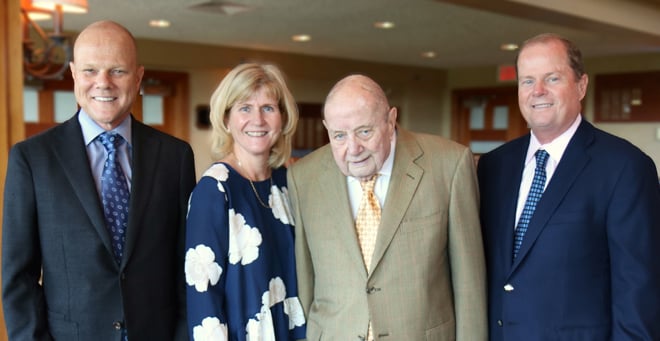 |
|
|
Members of the Remillard family, pictured here, established a $3 million endowed fund dedicated to providing ongoing support for community service initiatives. |
The Remillard Family Community Service Fund has awarded its second set of grants providing support for community outreach programs led by UMass Medical School faculty, staff and students. Established in 2015 with a $3 million donation from the Remillard Family Foundation, the endowed fund is dedicated to providing ongoing support for community service initiatives.
Each year, the Medical School solicits proposals from the UMass Medical School community for projects that will be evaluated on their potential to improve the lives and health of residents of Worcester and Central Massachusetts and positively impact individuals, groups and communities that are economically or educationally disadvantaged or underrepresented. Projects must also have a specific connection to UMass Medical School’s mission of education, patient care and research. Each selected proposals will be funded for one year.
Five projects were selected from the 31 proposals that were submitted. These new initiatives greatly expand the reach and scope of the fund.
The 2018 Remillard Family Community Service Fund projects are:
Overdose Prevention Fund support proposed by Kavita Babu, MD, associate professor of emergency medicine
The grant will support three projects to decrease overdose deaths:
1. Develop and deploy brief, targeted, tablet computer-based naloxone training videos specifically designed to teach the essential components of overdose recognition, naloxone administration and basic life support measures for patients and visitors in the UMass Memorial Medical Center Clinical Decision Unit;
2. Prepare and host two parent/caregiver symposia with community members and parents/caregivers to discuss talking about opioids with children and adolescents, identifying concerning behaviors, finding treatment, and preventive steps including limiting opioid access;
3. Provide post-surgical opioid disposal boxes to surgery practices to reduce unintended access to medications patients don’t finish taking after surgery. The innovative approach comprises having an opioid disposal box available at post-operative visits, and counseling patients about appropriate disposal of unused medication prior to their planned procedure.
Survivor-led trauma-informed pilot program to support victims of commercial sexual exploitation and sex trafficking in Worcester proposed by Jennifer Bradford, MD, MPH, assistant professor of family medicine & community health, and Ukpong Etteh, SOM ’20
The yearlong pilot program will recruit, train and retain three volunteers with lived experiences of sexual exploitation; support Living in Freedom Together, Inc. (LIFT) to develop educational workshops and grand rounds that will help the UMMS community to identify women as victims of sex trafficking within the health care setting; and strengthen community engagement of students from UMMS and academic partner Clark University to, as a public health goal, end commercial sexual exploitation. LIFT is a nonprofit organization that provides survivor-led, trauma-informed services to commercial sexual exploitation survivors in Worcester.
Safe Stations Project proposed by Matilde Castiel, MD, associate professor of medicine and commissioner of health and human services for the City of Worcester, and Kola Akindele, JD, MS, senior director of community and government relations and UMMS coordinator for the Worcester Academic Health Collaborative
In response to a call from the Worcester city manager to academic institutions to help the city battle the opioid epidemic, the Worcester Academic Health Collaborative, UMMS students and faculty will work closely with Department of Public Health staff to develop and implement Safe Stations. A new model that has shown success in other New England cities, Safe Stations employ first responders such as firefighters in an intervention that allows around-the-clock access to a recovery coach for individuals with substance use disorder at the nearest fire station. Recovery coaches provide transportation to and coaching through treatment. The model serves as a less intimidating option than a police station and reduces the burden on hospital emergency departments.
Integrated screening and referrals for social determinants of health within the Worcester Free Clinic Coalition (WFCC) proposed by Tatiana Pretovick, SOM ’21, WFCC student president, and Jay Broadhurst, MD, MHA, professor of family medicine & community health and WFCC board member and faculty advisor
This initiative will connect clients of the WFCC with social services through the training and utilization of student case managers. Case managers will utilize a screening survey aimed at identifying patients in need of social services and implement a centralized electronic referral system within the free clinics. The grant will fund a dedicated case management station at four of the five free clinics within the coalition. Each station will have a printer so that referrals can be printed for the client during the visit, printing supplies, and a dedicated mobile hotspot that will allow for uninterrupted access to the Community Help and Mass Health Connector websites.
Trauma-Informed Care for Children proposed by Audrey Smolkin, MPP, instructor in pediatrics
The project partners with the YWCA Central Massachusetts Early Education and Care Program to provide trauma-informed care for children and support for their caregivers in order to improve the outcomes of children and caregivers who have experienced trauma. Resources, training and a needs assessment supported by the grant include creating a safe, quiet environment to assist children in behavior de-escalation and regulation; strengthening families with targeted interventions to support parents and guardians of traumatized youth; and partnering with the UMass Child Trauma Training Center to develop a series of trauma-informed care trainings for childcare staff at the YWCA.
Related stories on UMassMedNow:
Worcester Public Schools and UMass Medical School unveil family support services initiative
New Remillard Family Fund at UMMS supports community service